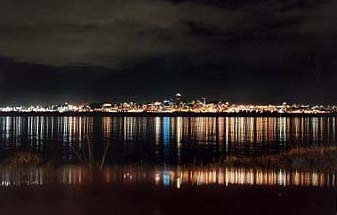|
|
|
An
Australian Looks Across Tasman Auckland's glitzy facade masks an economy crushed by New Zealand's doctrinaire pursuit of a free-market miracle. New Zealand's best and brightest have become refugees, writes Bernard Lagan, fleeing a falling currency, a lack of well-paid jobs and a country bowed by foreign debt. The New Zealand of even 15 years ago is unrecognisable. It has been sold. Globalised. Almost everything has gone to foreign owners - the banks, the insurers, the brewers, the forest companies, the media. Even those institutions regarded by many New Zealanders as public infrastructure are no longer locally controlled. The railways and Telecom were sold to big American companies a decade ago in an orgy of public asset sales first ignited by David Lange's mid-'80s Labour Government and continued by its conservative successor, the National Party. Lange has since recanted, many times. His treasurer, Roger Douglas, never has. If the economic wellbeing of the country is the measure of success, the great free market experiment is now judged by many ordinary New Zealanders to have faltered, if not failed. The foreign owners of New Zealand who have watched the New Zealand dollar collapse to US40 are sweating. To convince New Zealanders that her Government, which defines itself as social democratic and redistributive, can stop the slide, Clark sorely needs evidence that business is growing and investing. Motorola looked long and hard last month at establishing 200 quality jobs in a New Zealand-based software development plant. It went to Queensland instead, lured in part, it has to be said, by tax breaks and incentives that New Zealand says it cannot afford. Its international competitor, Ericsson, has made a modest research investment. While Clark and Anderton tell their nation they are hunting out fresh foreign investors, long-time observers of the New Zealand economy are beginning to think the foreign investment tap is running dry. One is economist, Dr Brian Easton, a former director of New Zealand's Institute of Economic Research and a member of the New Zealand Treasury's economic forecasting panel. He says: "I am actually quite pessimistic. The pessimism is that investors are beginning to get tired of promises of New Zealand's economic miracle which are not happening." So, too, some New Zealanders who've decided to stay or return home believe the country should resist the forces of globalisation and perhaps accept its albeit lower place in the world. Tim Finn, founder of Split Enz, is one: "I think that New Zealand should pull its horns in and not fret about its place in the world." He adds: "There is that feeling here of heroic endeavour that's doomed to failure as well, which I love. I think there is a poignancy in that.'' But Douglas Myers, the New Zealand businessman who inspired the Round Table and arguably fathered the great economic experiment, has shifted his millions offshore and is building a new house in London. |

